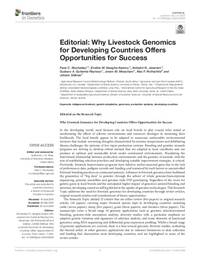Editorial: Why Livestock Genomics for Developing Countries Offers Opportunities for Success

Authors:
In the developing world, rural farmers rely on local breeds to play crucial roles aimed at ameliorating the effects of adverse environments and resources shortages in sustaining their livelihoods. The local breeds appear to be adapted to numerous unfavorable environmental stressors that include worsening droughts characterized by extreme temperatures and debilitating disease challenges, the epitome of low input production systems. Breeding and genetics research programs are striving to develop robust animals that are adapted to local conditions and can produce at optimal and sustainable levels under constrained environments. Elucidating the intertwined relationship between production environments and the genetics of animals, with the aim of establishing selection priorities and developing suitable improvement strategies, is critical. Previously, livestock improvement programs have failed to realize expected gains due to the lack of performance data, pedigree records and funding, and worsened by such factors as uncontrolled livestock breeding practices on communal pastures. Advances in livestock genomics have facilitated the generation of “big data” in genetics through the advent of whole genome/transcriptome sequencing, genome assemblies and genome-wide SNP genotyping. Regardless of the room for genetic gains in local breeds and the anticipated higher impact of genomics assisted breeding and selection, developing countries still lag behind in the uptake of genomic technologies. This Research Topic addresses the need for livestock genomics for developing countries through review articles, original research articles and considerations of future opportunities.
